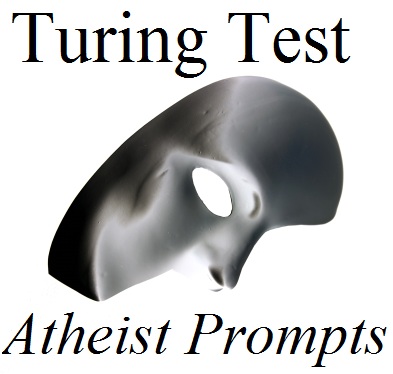This is part of the 2015 Ideological Turing Test series, where Christians and non-Christians test how well they understand one another.
In this second round, non-Christians (mostly atheists) answer the prompts honestly, and Christians try to answer them as they expect atheists to. Your job is to see if you can spot the difference. You can find all posts about the 2015 Ideological Turing Test here.
Below are answers to the question: What’s a question you’re currently uncertain about, where you’d like to “flip to the back of the book” and find the answer now?
Just make sure you fill out the quiz before you look at the comments! They’re open for speculation and discussion of the clues you think you’ve spotted.
Each contestant’s entry is followed by their bio, hidden by rot13.
1) In literary criticism, there are two (OK, a lot more than two, but for the purposes of this answer: two!) schools of thought: one, laid out in Barthes’ The Death of the Author argues that there is no real meaning to a work of art except that brought to it by the reader; the other, which I’d call the Nabokovian school of thought, argues that a work of art can indeed have a Right and a Wrong meaning and there can be misreadings.
In literature I’m a Nabokovian and in life I am more of a Barthesian (I know these aren’t words!) but sometimes, both in literature and in life, I wonder whether I have gotten it wrong. I’d like to flip to the back of the book on this one for sure.V nz n yvoreny Dhnxre jub jnf obea naq envfrq Pngubyvp. V nz n cnffvbangr ernqre naq n ybire bs cbrgel. V graq gb hfr zrgubqf bs yvgrenel nanylfvf gb nccebnpu zl snvgu.
2) I don’t really feel any pressing uncertainties, or like anything’s missing from how I am navigating the world right now. I feel like you don’t know you’re asking questions until after you have already found your answers, if that makes sense. Right now my biggest uncertainty is what career I should go launch myself into when I graduate in a few months. I’d really like to flip to the back of that book.
V nz n 20-lrne-byq Begubqbk Puevfgvna jub erpragyl pbairegrq sebz Pngubyvpvfz, fb V’ir tbg n ovg bs n zvkrq-hc oenva gurbybtvpnyyl. Gur Puevfgvna cneg vf cerggl fbyvq gubhtu. 😉
3) The ability of markets to provide fundamental governance services. Conventional theory holds that private property rights protection, rule of law, etc. cannot be provided by the market, and thus must be provided by governments (nation-states). The literature on analytic anarchy and private governance radically challenges the orthodoxy, both from the perspective of pure theory (‘without market prices for governance, how do we know we’re getting the efficient amount?’) and empirics/historical analysis (‘markets can fail; governments fail even worse.’)
Znyr, 27, Cu.Q., pbyyrtr cebsrffbe, Puevfgvna.
4) Do animals have moral weight? If so I’m complicit in the worst ongoing crime ever committed every time I have a burger. And pigs, at least, seem like they might have pretty sophisticated inner lives. But I really like meat. (Which shouldn’t matter even a little bit. I wouldn’t eat people just because people meat was delicious.)
FGRZ tenqhngr fghqrag; terj hc va gur Onl Nern, ngurvfg.
5) The true nature of human motivation. Like, how does “willpower” work? How can I make myself work harder? What is it in my brain that makes it easier or more difficult to carry on with a hard task? This is a subject the scientific community is very conflicted about right now. It’s not only practically useful, but I think it’s a really interesting question in its own right, and understanding it would go some way to better understanding the broader human condition.
Ng avtug, jura V fyrrc, V erireg gb zl gehr sbez. Vg jbhyq ubeevsl lbh. (ngurvfg)
6) Whether humanity survives and for how long. How far will space travel take us? Will we settle other planets?
V nz n pevgvpnyyl guvaxvat uhznavfgvp ngurvfg.
7) None, there are questions that I am uncertain about, but I would not want to “flip to the back of the book” to get the answers. I want my questions to be answered with solid justification and evidence this can’t be done by looking in the back, but only by working out the issues themselves. If this means I never get an answer then so be it.
N avuvyvfg
8) How to help a specific person in my life. They’re undergoing some really troubling struggles, and I wish that I could just find out how to help them and do it instead of muddling through and guessing wildly.
V’z n Pngubyvp. V’z n whavbe va pbyyrtr fghqlvat Pevzvany Whfgvpr naq Plorefrphevgl. V yvxr gb nethr.
Go on and make your guesses! Which of these were written in earnest, and which were someone’s best approximation of how someone across the religious divide would answer?

















